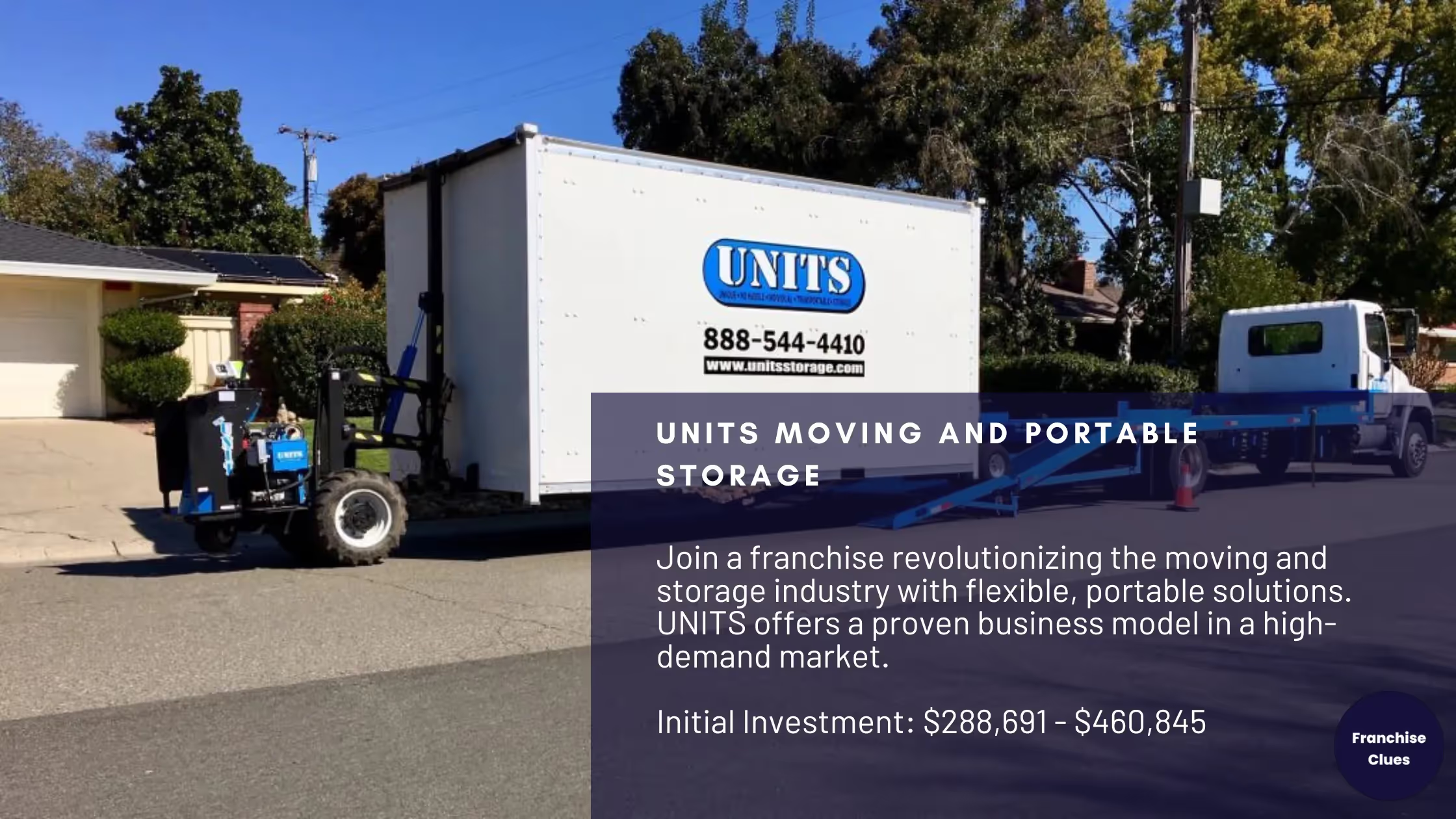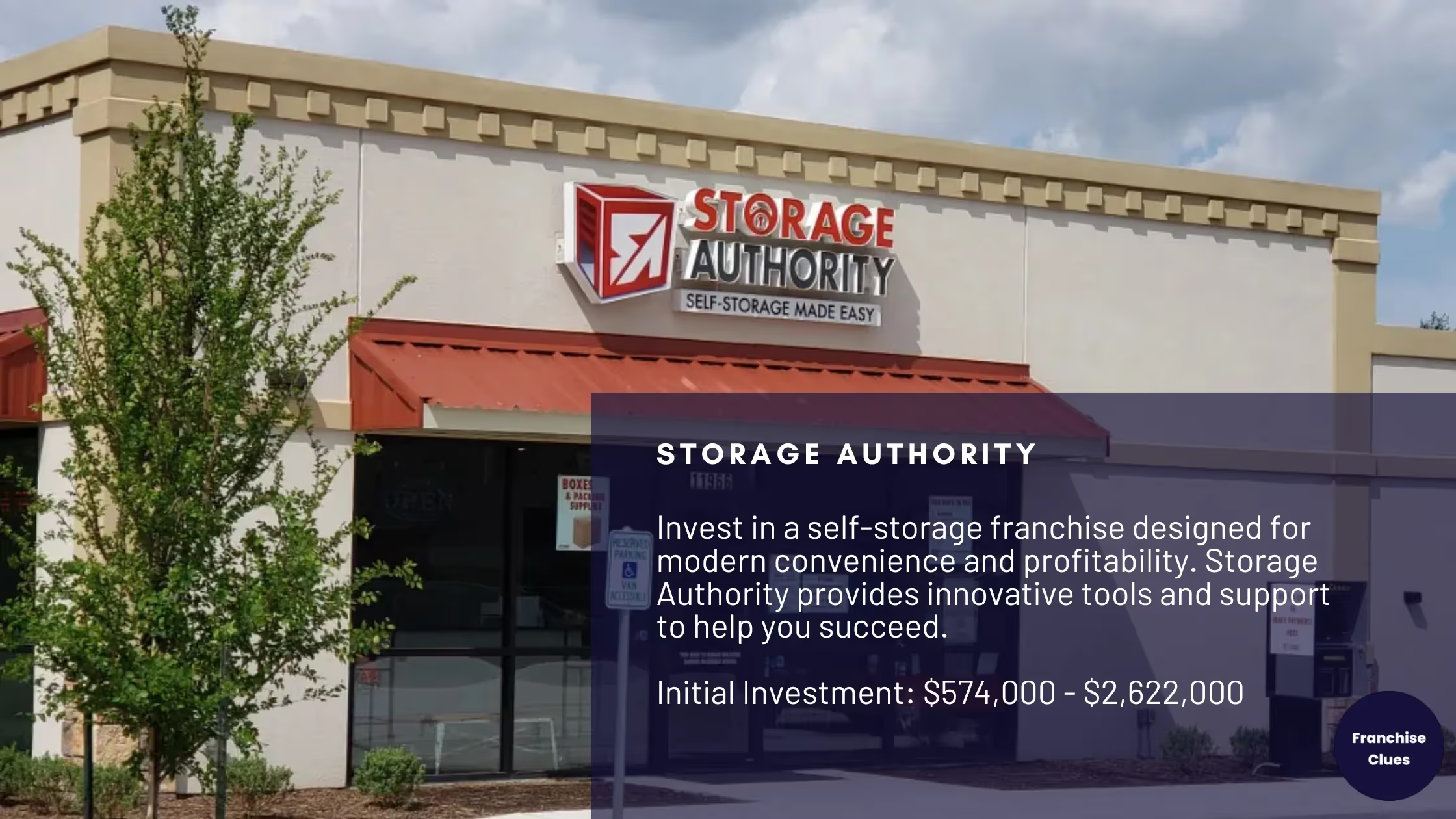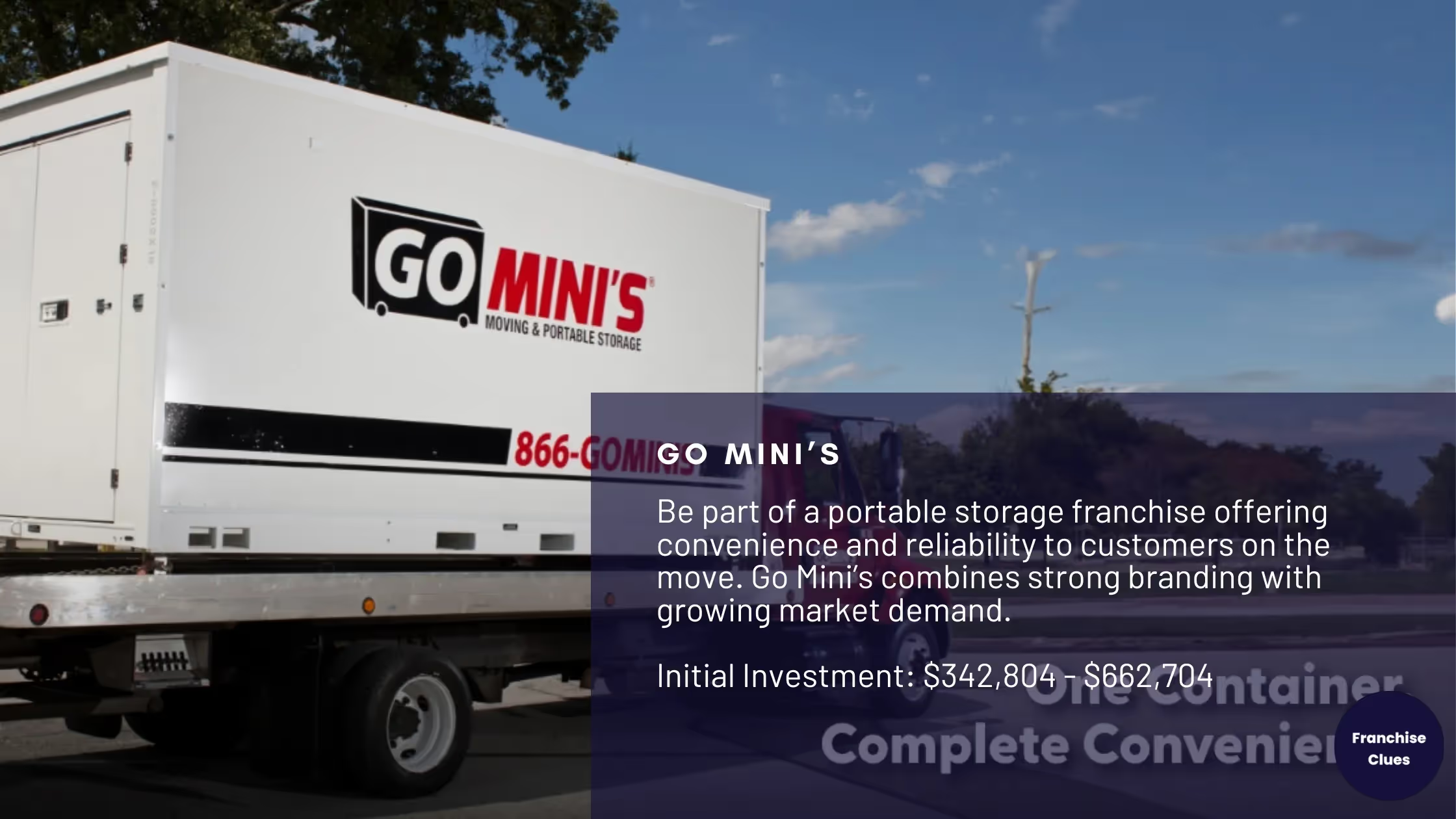Top Storage Franchises of 2025: Your Complete Guide


Franchise Opportunities By Industry
Franchise Opportunities By Location
Franchise 101
By Investment Level
Franchise Consultant
White Paper
Playbook


Thinking about getting into the storage business? Smart move. The storage industry keeps growing, and franchising lets you skip a lot of the trial-and-error that comes with starting from scratch.
In this guide, we'll walk you through 3 top storage franchises worth your attention in 2025. For each one, we'll break down what fees to expect and why people are choosing these brands. We've focused on UNITS, Storage Authority, and Go Mini's so you can see which one might fit your budget and goals.
Watch: Quick Overview of the Top Storage Franchise Opportunities in 2025
{{unit-franchise}}

Initial investment range: $288,691 - $460,845
Initial Franchise Fee: $55,500
Royalty Fee: 8% of gross sales
Marketing Fee: 2%
Business Model: Portable storage delivered to customer site
Why It's Great: UNITS has established a solid name in the portable storage business. Its unique ROBO-Lift delivery system gives its franchisees a real edge over competitors. With the company, you get large protected territories to work in, giving you ample space to grow your business without worrying about the same brand competing with you in your market.
Worth Knowing: UNITS storage containers are available in two dimensions, 12 feet and 16 feet, providing customers with choices in the matter. The containers are built to last in demanding conditions. They keep the rain and wind out and survive the kinds of storms that can happen in the kinds of places where UNITS has customers. The company waits until it has found a good working partner in a city before setting up a franchise there. UNITS also has a good training program for its franchisees.

Initial investment range: $1,500,000 - $3,500,000
Initial Franchise Fee: $69,000
Royalty: 6% + 2.5% for tech/sales/marketing
Business Model: Fixed-location self-storage units
{{quiz-blue}}
Why It's Great: Storage Authority dedicates itself to helping franchisees accumulate wealth through property ownership. They can create substantial enduring worth by owning the real estate rather than leasing it. Their coaching and training are excellent. They work exceptionally well with individuals who are operating a storage facility for the first time.
Worth Knowing: Established by Marc Goodin, a veteran in the industry, Storage Authority provides more than 25 years of self-storage know-how to their franchisees. They offer a "Franchise Development Program" quite unlike any other in the industry, which walks prospective franchisees through the all-important steps of site selection, facility design, and construction. These are the steps where too many independent operators make mistakes that cost them dearly, both in the short run and long after they're up and running.

Initial investment range: $759,024 - $1,247,125
Initial Franchise Fee: $85,000
Royalty: 8% gross sales (min. $400/month) + 2% marketing
Business Model: Mobile storage units for rent and delivery
Why It's Great: Go Mini's offers a lower entry point into the portable storage market. They've found a sweet spot serving both residential moves and temporary storage needs. Their veteran discount program is one of the better ones in the industry, making this an attractive option for military veterans looking to start a business.
Worth Knowing: Mini's containers come in three sizes (12', 16', and 20') to give customers a choice. This is an advantage over competitors who have fewer options. Padded wheels on the containers keep driveways from getting damaged. This is a detail customers are grateful for. The company offers an exclusive online reservation system that is capable of making operations run more smoothly and enhancing the customer experience. Many franchisees of Go Mini's begin with a mere 30 containers and expand as demand increases. This makes the opening investment much more manageable than several competitors.
The storage business isn't flashy, but that's part of its charm. It's a steady performer that continues to grow for some very practical reasons:
The self-storage industry now represents over $40 billion in annual revenue in the US alone, with consistent growth even during economic downturns.
Scalable Model – Initiate with a definite number of units and append additional ones as the appetite for your offering increases. Your business can grow without having to completely overtake your systems.
Finding the right storage franchise isn't just about the lowest cost or biggest name. You need to match the business to your goals, resources, and local market. Here's what to consider before signing any agreement:
Use this table to score potential franchises based on what matters most to you. The highest-scoring options will likely be your best fit, but don't forget to trust your gut after meeting with the franchise team.
Yes, storage franchises are widely considered one of the more stable and profitable franchise categories. They tend to weather economic downturns better than many retail or service businesses.
Your profitability will depend on several factors:
The franchise system gives you a head start by providing proven marketing strategies, operational systems, and brand recognition—all things that can take years to develop independently.
The storage business model is refreshingly straightforward:
Primary Revenue: Customers pay a monthly rental fee to store their belongings. The fee they pay can be affected by a number of different factors, including, but not limited to, the size of the unit they are renting, the location of the unit (even within the same metropolitan area), and a variety of unit features (including climate control, security level, etc.).
Secondary Revenue Streams:
This model's predictability is something that a lot of storage owners appreciate. That’s because the storage business has relatively steady income compared to the ups and downs of retail or restaurants. With self-storage, the owners have a kind of subscription service. The average monthly rental rates have been increasing, and the occupancy seems to be on the way up. Without the kind of fluctuation that happens with a retail situation, the income potential with self-storage seems to be pretty good.
Starting costs run approximately $350,000 for mobile storage units and can go well beyond $1 million for permanent facilities, especially when you have to buy the land. Your choice of location and the kind of facility you build will have a major impact on the startup cost.
Absolutely, when sited and operated correctly. Most storage franchises achieve profitability within 1 to 3 years, with margins improving as occupancy rates rise. This is a stability business, driven by a recurring revenue model that most other businesses can only dream of.
Not always. Portable storage franchises like UNITS and Go Mini's typically need a yard or lot to store containers, which can be leased. Fixed-location franchises like Storage Authority encourage land ownership but may have lease options in some cases.
Fixed storage requires customers to bring their items to your facility, while portable storage involves delivering containers to the customer's location. Portable models often serve both storage and moving needs, while fixed locations focus on longer-term storage.
Numerous franchisees in the storage industry employ managers to oversee everyday operations. When it comes to portable storage, active management is generally required for deliveries. In contrast, once staff and systems are in place, fixed storage facilities can be more hands-off.
Simple and steady are two words that describe storage franchises in terms of their business model. In a world where business seems ever more complicated, these franchises cut through that complexity. Find a storage franchise, and you’ve found something with a business model that’s—if not completely straightforward—at least comprehensibly complicated in a way a lot of people can understand. Find a storage franchise, and you’ve found something with steady demand and manageable operations—an ever-growing need for storage space and an increasingly effective way to deliver it.
Make the next move by investigating which model aims at your goals, is within your budget, and fits your lifestyle. The correct storage franchise can yield stable, long-term returns and build equity in a business that is seeing ever-growing demand. No other industry is even close.
Need personalized guidance? Franchise Clues offers complimentary, personalized consulting to match you with the most suitable storage franchise for your individual scenario. Our franchise professionals are well-versed in all the required areas, and they are available to help you understand what you need to know about investment amounts, area availability, and which storage franchise model is right for you—whether you want to run an active business or prefer a more hands-off investment. They are eager to help you get started on your own storage business. Take a few moments to schedule a free consultation, and you'll be on your way. You can also start by taking our franchise matching quiz.